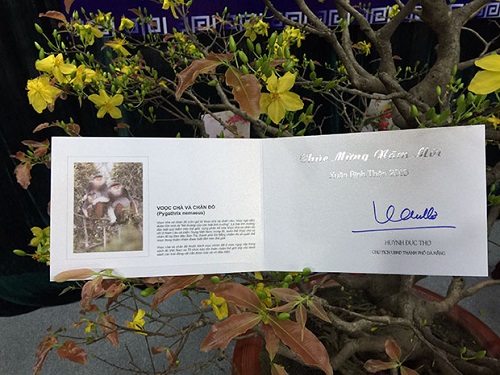Red-shanked douc langurs - a new symbol of the city
Da Nang’s Son Tra Peninsula is now home to around 530 red-shanked douc langurs, which accounts for 83% of the world’s total of this ‘Queen’ of the primate species. According to a recent survey conducted by an international douc langurs conservation organisation, these special animals are now threatened with extinction in the rest of the world, although they are living safely on this peninsula.
Since 1969, many researchers and filmmakers from both home and abroad have visited the peninsula to learn about the red-shanked douc langurs and produce scientific documentaries about them. Thanks to this, the rare animal has become more popular with people around the world.
 |
| Chairman Tho’s Tet greetings card |
However, over recent years the city has seen a rapid growth in its socio-economic activities, especially in the tourism sector, which has negatively affected the living environment of these langurs.
In an effort to solve this problem, the municipal authorities have asked relevant agencies to take effective measures to protect the douc langurs on the peninsula. Their focus has been on encouraging residents to give up their hunting and firewood-collecting habits in the Son Tra Nature Reserve.
Recently, the Son Tra Peninsula Strategic Vision Plan, which was drawn up by Skidmore, Owings and Merrill LLP (SOM) from the USA, has been awarded the excellence prize by the American Institute of Architects (AIA). One important reason for the unit winning the award seems to be that the project outlines strategies to guide future development and to protect the peninsula's natural assets, which are currently threatened by the pressures of economic development.
Campaigns to protect the red-shanked douc langurs on Son Tra Peninsula have also attracted a great deal of attention from young people. They have suggested that images of the rare primates should be printed on posters at bus stations, on souvenirs and on dustbins. They say that leaflets should be distributed which contain information and images about this animal, and advice about what not to do when visiting the peninsula.
Most notably, the 2016 Tet greetings card from the municipal People’s Committee Chairman Huynh Duc Tho features an image of a family of red-shanked douc langurs and some brief information about this animal. On the greeting card, Chairman Tho wishes recipients a happy and warm Tet festival, and encourages them to join efforts with the authorities to protect this rare primate.




